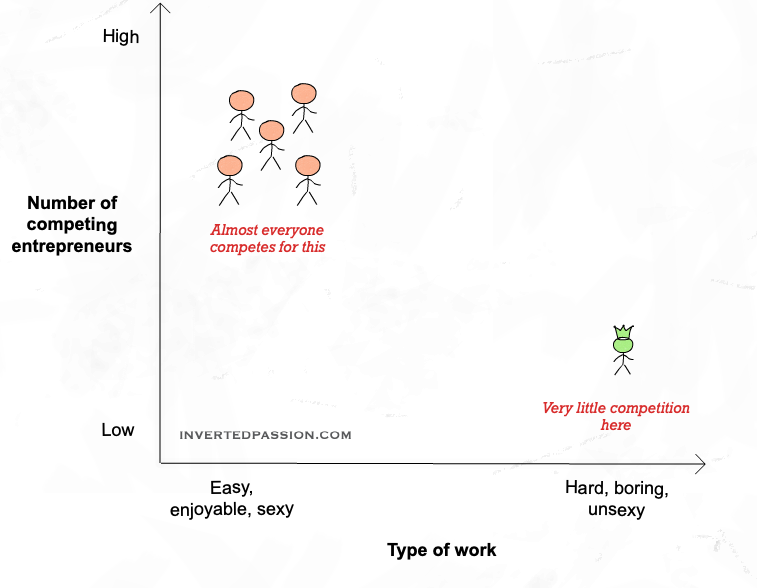Business opportunities that seem easy, or those that require minimal effort or investment are easy for everyone (and not just you). Most people naturally gravitate towards work that’s easy, enjoyable, or sexy. This is why you have so many entrepreneurs make mobile apps because coding an app is fun and relatively easy.

Real advantage, however, lies in doing what others aren’t willing to do. Such work is either really hard, or takes an enormous amount of time or requires enormous capital, or is extremely boring or is unsexy. The fewer number of competitors in these less popular domains usually translates into a much higher chance of building a profitable business.
A fantastic example of this is what Amazon does. They’ve focused on long-horizon investments into logistics, warehouses, and data centers which take decades to start producing a return. This long horizon requires patience and not all entrepreneurs or investors have it. But Jeff Bezos considers this lack of patience in other companies precisely his unfair competitive advantage.
In an interview, Bezos once said:
“If everything you do needs to work on a three-year time horizon, then you’re competing against a lot of people,”
This idea of long-term thinking as a competitive advantage is clear to Bezos from day 1. In his very first letter to Amazon shareholders in 1997, he said: “We believe that a fundamental measure of our success will be the shareholder value we create over the long term.” The reminder for long-term thinking is so important to him that this original 1997 letter gets included in all their annual shareholder letters. Given his fascination with long-term thinking, it’s not surprising that he got a clock built that is designed to keep time for 10,000 years.
Long-term thinking isn’t the only “hard” competitive advantage however it’s an important one because in a world where everyone is chasing short-term success. It lets you focus on doing really hard things over a period of time and hence eliminates competition for those projects. Other competitive advantages could be doing what’s unsexy or boring (like waste management, tax, and accounting, or mainframes).
A word of caution: it’s easy to convince oneself that you’re long-term oriented or doing something that is hard while your actions gravitate towards short-term or easier stuff.
Remember: competitive advantage doesn’t come via doing what’s easy. It comes via things that others aren’t willing or able to do.
This essay is part of my book on mental models for startup founders.
Join 200k followers
Follow @paraschopra